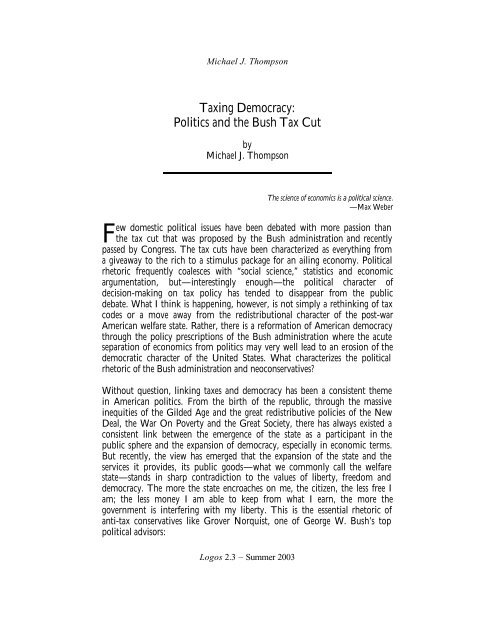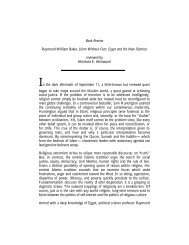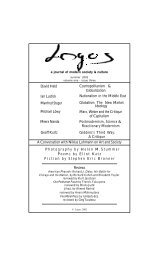Michael J. Thompson Stephen Eric Bronner Wadood Hamad - Logos
Michael J. Thompson Stephen Eric Bronner Wadood Hamad - Logos
Michael J. Thompson Stephen Eric Bronner Wadood Hamad - Logos
Create successful ePaper yourself
Turn your PDF publications into a flip-book with our unique Google optimized e-Paper software.
F<br />
<strong>Michael</strong> J. <strong>Thompson</strong><br />
Taxing Democracy:<br />
Politics and the Bush Tax Cut<br />
by<br />
<strong>Michael</strong> J. <strong>Thompson</strong><br />
<strong>Logos</strong> 2.3 – Summer 2003<br />
The science of economics is a political science.<br />
—Max Weber<br />
ew domestic political issues have been debated with more passion than<br />
the tax cut that was proposed by the Bush administration and recently<br />
passed by Congress. The tax cuts have been characterized as everything from<br />
a giveaway to the rich to a stimulus package for an ailing economy. Political<br />
rhetoric frequently coalesces with “social science,” statistics and economic<br />
argumentation, but—interestingly enough—the political character of<br />
decision-making on tax policy has tended to disappear from the public<br />
debate. What I think is happening, however, is not simply a rethinking of tax<br />
codes or a move away from the redistributional character of the post-war<br />
American welfare state. Rather, there is a reformation of American democracy<br />
through the policy prescriptions of the Bush administration where the acute<br />
separation of economics from politics may very well lead to an erosion of the<br />
democratic character of the United States. What characterizes the political<br />
rhetoric of the Bush administration and neoconservatives?<br />
Without question, linking taxes and democracy has been a consistent theme<br />
in American politics. From the birth of the republic, through the massive<br />
inequities of the Gilded Age and the great redistributive policies of the New<br />
Deal, the War On Poverty and the Great Society, there has always existed a<br />
consistent link between the emergence of the state as a participant in the<br />
public sphere and the expansion of democracy, especially in economic terms.<br />
But recently, the view has emerged that the expansion of the state and the<br />
services it provides, its public goods—what we commonly call the welfare<br />
state—stands in sharp contradiction to the values of liberty, freedom and<br />
democracy. The more the state encroaches on me, the citizen, the less free I<br />
am; the less money I am able to keep from what I earn, the more the<br />
government is interfering with my liberty. This is the essential rhetoric of<br />
anti-tax conservatives like Grover Norquist, one of George W. Bush’s top<br />
political advisors:




